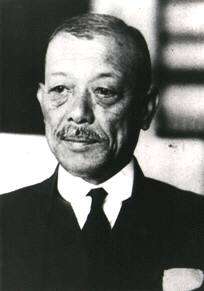Hisaakira Hijikata
In this Japanese name, the family name is Hijikata.

Hisaakira Hijikata
Hisaakira Hijikata (土方久徴 Hijikata Hisaakira, October 8, 1870 – August 25, 1942) was a Japanese businessman, central banker and the 12th Governor of the Bank of Japan (BOJ).
Early life
Hijikata was born in Mie Prefecture.[1]
Career
In 1897, Hijikata was a BOJ trainee along with Junnosuke Inoue. Both young men were sent by the bank to learn about British banking practices in London.[2]
In 1918, Hijikata was named head of the Industrial Bank of Japan.[3]
Hijikata was Governor of the Bank of Japan from June 12, 1928 through June 4, 1935.[4] During his tenure, financial difficulties in Europe and the suspension of the gold standard by the United Kingdom affected Japan; and the situation was exacerbated by the "Manchurian disturbance".[5]
Notes
- ↑ Bank of Japan (BOJ), 12th Governor
- ↑ Metzler, Mark. (2006). Lever of Empire: the International Gold Standard and the Crisis of Liberalism in Prewar Japan, p. 9., p. 9, at Google Books
- ↑ Tamaki, Norio. (1995). Japanese banking: a History, 1859-1959, p. 249, p. 249, at Google Books
- ↑ BOJ, List of Governors; "Heads Bank of Japan; Fukai, Vice Governor, Is Promoted as Hijikata Retires," New York Times. June 4, 1935; retrieved 2011-08-22
- ↑ "Annual Report of the Bank of Japan," 18 Federal Reserve Bulletin (US), Vol 18, p. 309. (1932)
References
- Metzler, Mark. (2006). Lever of Empire: the International Gold Standard and the Crisis of Liberalism in Prewar Japan. Berkeley: University of California Press. ISBN 9780520244207; OCLC 469841628
- Tamaki, Norio. (1995). Japanese banking: a History, 1859-1959. Cambridge: Cambridge University Press. ISBN 9780521496766; OCLC 231677071
| Government offices | ||
|---|---|---|
| Preceded by Junnosuke Inoue (2nd term) |
Governor of the Bank of Japan 1928-1935 |
Succeeded by Eigo Fukai |
This article is issued from Wikipedia - version of the 2/22/2016. The text is available under the Creative Commons Attribution/Share Alike but additional terms may apply for the media files.